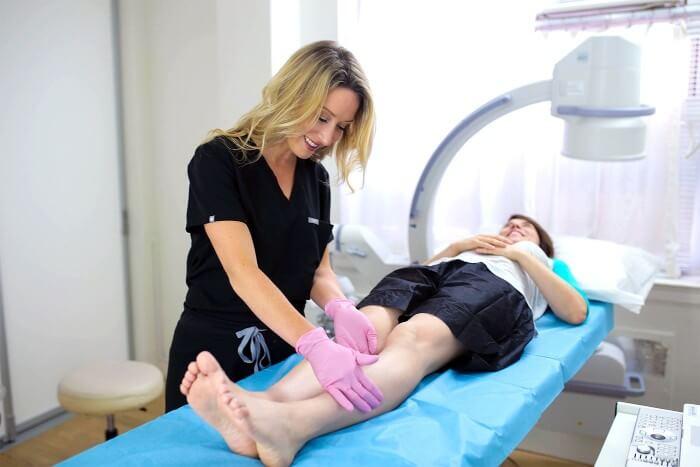What kind of doctor specializes in veins?
If you have vein problems, such as spider veins and varicose veins, you’re probably wondering, “what kind of doctor specializes in veins?” Well, the branch of medicine concerned with vascular health is known as phlebology, and the physicians specializing in phlebology are officially known as phlebologists. However, phlebologists are colloquially known as vein doctors, vein specialists, vein experts, vein physicians, or vascular doctors. If you’re looking for a doctor specializing in veins, you can simply focus on vein doctors.

What doctor do you see for vascular problems?
If you have vascular problems, such as spider veins, varicose veins, and vein disease, you need to consult reliable vein doctors. But you shouldn’t consult the first vein doctor you find. Physicians can officially call themselves phlebologists after passing a few simple written examinations — the bar for entry into phlebology is pretty low. If you want an expert who can offer the latest and safest vein treatment solutions, you need a reliable vein doctor with specialized training in minimally invasive vein treatments.
When looking for vein doctors, you should focus on a few essential qualities — board certification, residencies and fellowships, and specialization. You should ideally look for vein doctors who are board-certified by the American Board of Venous and Lymphatic Medicine, an organization that officially certifies the country’s top 1% of vein doctors. In order to get board-certified, vein doctors must complete numerous challenging professional milestones, such as residency programs and fellowships in relevant fields.

You should also look for vein doctors with specialized training in minimally invasive endovascular procedures, such as radiofrequency ablation, venaseal, and sclerotherapy. If the vein doctor doesn’t have specialized training in minimally invasive vein treatments, you should probably find someone else. Inexperienced vein doctors often treat spider veins and varicose veins without diagnosing the root cause of the problem, leading to a high risk of vein disease recurrence. If you want long-lasting results, you must contact the best vein doctors.
The Vein Treatment Clinic is a group of state-of-the-art vein clinics led by board-certified, Ivy League-educated, and fellowship-trained vein experts specializing in the latest minimally invasive spider vein and varicose vein treatments. Our vein doctors always examine your leg veins, review your medical history, administer vascular imaging tests, and curate personalized vein treatment plans just for you. If you have vascular problems, please contact our vein doctors to remove varicose veins and spider veins.
Do cardiologists deal with varicose veins?
Cardiologists are medical experts specializing in the diagnosis and treatment of cardiovascular problems, i.e., conditions related to the heart and blood vessels. Since most vein problems occur because of an underlying circulatory disorder, treating varicose veins falls within the purview of cardiologists. If your vein doctor also happens to be a cardiologist, they may have even more experience in diagnosing and treating your vein problems.
How do you know if you have vein problems?
Some of the earliest signs and symptoms of vein problems are fairly mild and benign, such as leg swelling, leg pain, leg heaviness, frequent leg cramps, and restless leg syndrome. Most people misattribute these symptoms to aging or exhaustion, leaving vein disease undiagnosed for extended periods. However, the symptoms of vein disease usually worsen at night or after long periods of sitting or standing still for long periods. If your symptoms worsen at night, that’s a pretty strong indication that you have vein problems.
Spider veins and varicose veins are the most obvious signs of underlying vein disease. Spider veins are dense clusters of damaged blood vessels and broken capillaries on your legs. They appear in web-like formations on the skin’s surface without bulging outwards. Varicose veins are dense blood vessels that bulge out of the skin’s surface, often resembling twisted and tangled ropes or branches. If you notice spider veins and varicose veins, you must contact your vein doctor.
When should I be worried about veins in my legs?
You don’t have to be worried about the veins in your legs. Venous insufficiency is a chronic condition that gradually worsens, but it’s not a medical emergency. You should definitely contact a vein doctor and treat underlying vein disease before the symptoms worsen, but you don’t have to panic.
What causes bulging veins in the legs?
The veins in your legs bulge outwards because of the accumulation of excess blood in the saphenous vein. When your vein valves collapse, blood flows backward due to gravity and accumulates in the leg veins, eventually leading to vascular dilation and the formation of bulging veins in the legs (varicose veins). Chronic venous insufficiency is the root cause of most vein problems, including varicose veins and spider veins.
Is walking good for varicose veins?
Walking is good for general vascular health because it improves blood flow towards the heart and pushes some of the accumulated blood away from your leg veins. Walking might alleviate some of the symptoms of vein disease and make you feel better, but the relief is temporary. When you stop walking, blood will again accumulate in your leg veins. The only way to treat varicose veins is through minimally invasive spider vein and varicose vein treatments.
If you have spider veins or varicose veins, you can implement a few lifestyle changes to improve your symptoms. You should start wearing compression stockings, engage in exercises that activate your calf muscles, and elevate your legs while sitting down. But most importantly, you must contact a reliable vein doctor to explore your vein treatment options.








